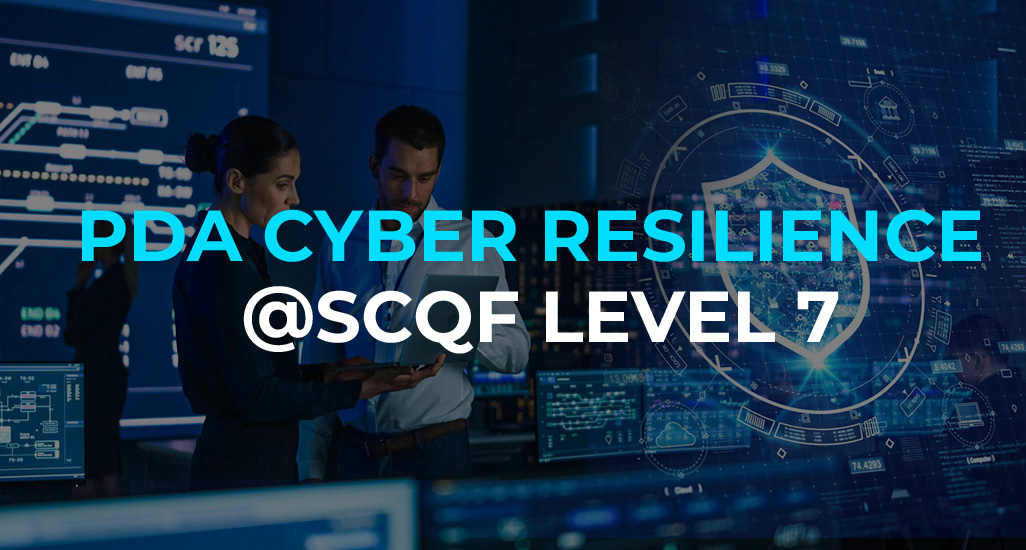
This Professional Development Award (PDA) is part of a broader suite designed to integrate the knowledge and understanding required by popular vendor-neutral certifications into the Scottish Qualifications Authority (SQA) Higher National frameworks. These qualifications offer an alternative learning pathway aimed at individuals in non-cybersecurity professional roles who wish to enhance their awareness and knowledge of cyber resilience practices.
The qualification at SCQF Level 7 is designed for learners with no prior background in cybersecurity, aiming to develop a solid foundational understanding. This qualification provides a strong base, enhancing awareness of cybersecurity practices and is intended for individuals who typically work in a variety of roles not directly related to cybersecurity.
Additionally, this qualification is suitable for learners without any formal education or experience in cybersecurity, offering them the opportunity to build foundational knowledge. It is particularly beneficial for those with a passion for pursuing a career in cybersecurity but who lack the prerequisite knowledge.
This Professional Development Award (PDA) is part of a series that has been created to include the knowledge and understanding needed for popular Vendors’ Neutral awards within SQA’s Higher National frameworks.
https://www.sqa.org.uk/sqa/94638.html
These qualifications offer a solid foundation, raising awareness of cyber security practices. They are designed for learners who typically work in various roles unrelated to cyber security.
According to SQA, there are no formal entry qualification requirements for any level:
This course has been arranged in conjunction with the SQA PDA Cyber Resilience at SCQF Level 7. Learners will have an opportunity to earn 32 SCQF credit points & received a certificate from Scottish Qualification Authority if successfully passed all relevant SQA unit exams, exam fee is included in the SAAS PTFG funding.
The SQA units are as follows:
| MANDATORY (M) | HN UNIT CODES | UNIT
TITLES |
SQA
CREDIT |
SCQF CREDIT POINTS | SCQF LEVEL |
| M | J0H9 34 | Data Security | 1 | 8 | 7 |
| M | HT9V 34 | Cyber Resilience | 1 | 8 | 7 |
| M | J0HH 34 | Professionalism & Ethics in Cyber Security | 1 | 8 | 7 |
| M | J0HF 34 | Social Engineering | 1 | 8 | 7
|
| Total SCQF Credits Awarded | 32 | ||||
The IT training classes which we are currently offering are suitable for a wide range of candidates including:
Learners may progress to further specialised training, education, or employment opportunities in cybersecurity. These qualifications are designed to support advancement along various pathways within cybersecurity or related fields. However, individuals completing lower levels may require additional training before being adequately prepared for employment in cybersecurity-related roles.
Progression options include:
The only learning option available for this course is through our e-learning platform, also known as self-paced learning. This format allows learners to study independently at their own pace, providing flexibility to fit their studies around personal and professional commitments.
Self-paced e-learning offers several advantages:
Flexibility: Learners can access the course materials anytime and anywhere, allowing them to progress through the content at a speed that suits their individual needs.
Personalised Learning: Learners can focus on areas where they need more understanding and move quickly through topics, they are already familiar with.
Access to Resources: The e-learning mode provides continuous access to multimedia resources, interactive materials, and assessments that can help reinforce learning.
This approach is ideal for individuals who prefer to manage their own time and learning schedule while still receiving a structured curriculum to guide their progress.
If there are any concerns regarding your eligibility, you may be required to attend an interview with a member of the course team. Additionally, a basic aptitude test will be administered to assess your understanding of the course content. A course consultant will assist you in completing the necessary forms and provide further guidance if needed.
SAAS Funding: Course funding is available for this course through SAAS, including the SQA exam fee.
Self-Funding: If any student does not qualify for SAAS funding, they can self-finance this course